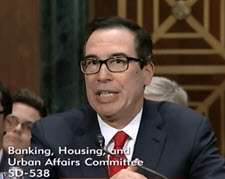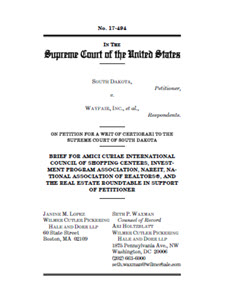The Roundtable joined an industry coalition in filing an amicus curiae brief on March 5 with the U.S. Supreme Court in South Dakota v. Wayfair, Inc., No. 17-494 – a case that addresses the constitutionality of states’ authority to collect sales and use taxes on Internet consumer purchases. (SCOTUSblog)
 |
|
The Roundtable joined an industry coalition in filing an amicus curiae brief on March 5 with the U.S. Supreme Court in South Dakota v. Wayfair, Inc., No. 17-494 – a case that addresses the constitutionality of states’ authority to collect sales and use taxes on Internet consumer purchases. |
After the high Court accepted Wayfair in January, the case has become the long-awaited judicial vehicle that may level the playing field between Internet-based retailers and “brick and mortar” stores. The industry amicus brief, drafted by former U.S. Solicitor General Seth Waxman and his colleague Ari Holtzblatt, urges the Supreme Court to overturn a pair of decades-old decisions (e.g., Quill Corp. v. North Dakota (1992) and National Bellas Hess, Inc. v. Department of Revenue of Illinois (1967). Wayfair directly challenges these pre-Internet opinions, which prohibit states from imposing tax collection obligations on web-based, catalog, and other retailers that lack an in-state physical presence.
In today’s e-commerce driven world, the brief notes, the law should focus on retailers’ economic rather than physical presence, and level the playing field for all retailers who have in-state sales above a certain threshold.
The brief explains how the outmoded court decisions continue to have damaging effects that reach far beyond actual brick-and-mortar outlets. “First, the loss of physical stores, many of which are integral to the social fabric of their communities, increases unemployment and creates a sense of dislocation among community residents. Second, the decline in the retail sector reduces the value of retail real estate, discourages further development of retail properties, and impedes innovation in the retail sector. Third, the lost revenue from sales, property, and income taxes threatens the ability of state and local governments to provide much-needed public services, including those that benefit online retailers,” the brief states.
The Roundtable joined The International Council of Shopping Centers, Investment Program Association, Nareit®, the National Association of REALTORS® , the National Multifamily Housing Council, NAIOP, the American Farm Bureau Federation and the South Dakota Farm Bureau Federation on the amicus brief, which re-iterates many points set forth by a real estate coalition in an initialamicus brief filed last November. (Roundtable Weekly, Nov. 3, 2017)
Trump Administration Solicitor General Noel Francisco also joined the wave of other submissions to SCOTUS on March 5. The Justice Department brief states, “In light of internet retailers’ pervasive and continuous virtual presence in the states where their websites are accessible, the states have ample authority to require those retailers to collect state sales taxes owed by their customers.” (Amicus brief of USA and Wall Street Journal, March 5)
SCOTUS is scheduled to hear oral argument on April 17 and is expected to render a decision by the end of June. (Roundtable Weekly, Jan. 12)




